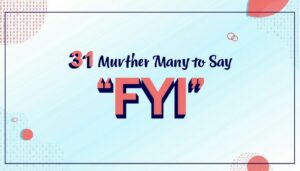We all know the joy of hearing good news, whether it’s from a friend, family member, or colleague. Expressing our happiness for others not only strengthens relationships but also fosters a supportive and positive environment.
While “Glad to hear that” is a common response, it’s always great to have a variety of phrases in your communication toolkit.
This article offers 23 alternative ways to convey your enthusiasm, ensuring that you bring warmth, sincerity, and encouragement to your conversations.
“That’s Wonderful News!”
Meaning & Context: This phrase conveys genuine happiness for the other person’s achievement or good news. It’s suitable for both casual and professional contexts, providing a strong sense of support.
Example: “You’ve been promoted? That’s wonderful news!”
Impact: It elevates the positivity of the moment and shows that you truly value their success.
“I’m Thrilled to Hear That!”
Meaning & Context: When you want to express strong excitement, this phrase is perfect. It’s ideal for personal achievements or when hearing exciting news that deserves extra enthusiasm. Example: “You’re having a baby? I’m thrilled to hear that!”
Impact: This phrase helps to amplify the joy and makes the conversation feel more engaging.
Glad to Hear That Meaning
“Glad to hear that” is an expression used to show happiness, relief, or appreciation upon hearing positive news. It conveys that the listener is pleased with the information shared. It is typically used in informal settings, but can also be appropriate in professional contexts when responding to good news.
Example Usage:
- Scenario: If a friend tells you they got a job offer, you might say, “Oh, that’s great! I’m glad to hear that!”
- Context: Expresses a positive reaction to good news.
Glad to Hear That Synonym
There are various phrases you can use instead of “glad to hear that,” each carrying similar meanings but varying in tone or formality. Here are some common alternatives:
Example Usage:
- Scenario: When someone shares their promotion news, you could say, “That’s fantastic! Well done!”
- Context: Used to express enthusiasm and joy in response to positive updates.
Glad to Hear That Reply
The phrase “Glad to hear that” is often used as a reply when someone shares something positive. It’s a way to acknowledge the news and show you’re happy for the person.
Example Replies:
- “I’m happy for you!”
- “That’s great to hear!”
- “Such good news!”
- “That’s awesome!”
Example Usage:
- Scenario: If a colleague tells you they have finished a major project, you can reply, “Glad to hear that! Great job!”
- Context: Acknowledges the positive news in a friendly and supportive manner.
Glad to Hear That Answer
This variation of the phrase is used when you hear a response to a question or concern that brings relief or satisfaction. It’s a way of acknowledging that the answer received is favorable or positive.
Example Usage:
- Scenario: If you’re unsure whether a project will be completed on time and the answer is affirmative, you might say, “Glad to hear that answer. Thanks for confirming!”
- Context: Used to express satisfaction with a response, especially in more formal or professional exchanges.
“How Exciting!”
Meaning & Context: Simple yet effective, this phrase works well in both formal and informal settings. It’s perfect when you want to show genuine interest and excitement.
Example: “You’ve booked your dream vacation? How exciting!”
Impact: It expresses a light, positive emotion that keeps the conversation upbeat.
Glad to Hear That Artinya
“Glad to hear that” artinya (meaning) dalam Bahasa Indonesia adalah ungkapan untuk menyatakan kebahagiaan atau rasa senang setelah mendengar kabar baik. Ini adalah cara yang sopan dan ramah untuk menunjukkan reaksi positif terhadap informasi yang diberikan.
Contoh Penggunaan:
- Situasi: Jika temanmu memberi tahu bahwa mereka baru saja lulus, kamu bisa berkata, “Wah, senang mendengarnya!”
- Konteks: Digunakan untuk menyatakan kebahagiaan atau kepuasan setelah mendengar berita positif.
Glad to Hear Synonym
Beberapa sinonim untuk “glad to hear” yang bisa digunakan untuk mengekspresikan kebahagiaan atau kepuasan mendengar kabar baik antara lain:
- “That’s great to hear”
- “That’s wonderful!”
- “That’s fantastic!”
- “I’m happy to hear that”
- “So glad to hear that”
Contoh Penggunaan:
- Situasi: Ketika teman mengatakan bahwa mereka berhasil mendapatkan pekerjaan baru, kamu bisa berkata, “That’s wonderful! Congratulations!”
- Konteks: Digunakan untuk menunjukkan reaksi positif yang penuh semangat terhadap berita baik.
That’s Great to Hear
“That’s great to hear” adalah cara lain untuk mengungkapkan kebahagiaan atau kepuasan setelah mendengar kabar baik. Frasa ini sering digunakan dalam percakapan santai maupun formal, dan menekankan rasa positif terhadap informasi yang disampaikan.
Contoh Penggunaan:
- Situasi: Setelah mendengar bahwa rekan kerja mendapatkan penghargaan, kamu bisa berkata, “That’s great to hear! You deserve it.”
- Konteks: Menyampaikan rasa senang atau terkesan terhadap berita positif.
Another Word for Glad to Hear
Ada beberapa alternatif lain untuk “glad to hear” yang dapat digunakan dalam berbagai situasi untuk mengekspresikan rasa senang atau bahagia mendengar berita baik. Beberapa contohnya adalah:
- “Happy to hear”
- “Pleased to hear”
- “Good to know”
- “Delighted to hear”
- “Nice to hear”
Contoh Penggunaan:
- Situasi: Jika seseorang memberitahumu bahwa mereka telah sembuh dari sakit, kamu bisa berkata, “I’m pleased to hear that! Take care.”
- Konteks: Menunjukkan apresiasi atau kepuasan terhadap berita yang diterima.
Another Way to Say I’m Glad to Hear That
Ada banyak cara lain untuk mengatakan “I’m glad to hear that,” yang bisa lebih memperkaya variasi ekspresimu, baik dalam percakapan santai atau formal. Beberapa contoh alternatifnya adalah:
Contoh Penggunaan:
- Situasi: Ketika seseorang memberi tahu bahwa mereka mendapatkan promosi, kamu bisa berkata, “I’m thrilled to hear that! Congratulations!”
- Konteks: Menunjukkan kegembiraan yang lebih besar atau tingkat antusiasme terhadap berita yang disampaikan.
“That’s So Heartwarming!”
Meaning & Context: This phrase works best when hearing touching or emotional news. It’s a wonderful choice for personal conversations where someone shares something that touches your heart.
Example: “Your charity work is really making a difference. That’s so heartwarming!”
Impact: It creates a deeper connection, showing empathy and genuine joy in the other person’s good fortune.
“I’m So Happy for You!”
Meaning & Context: This phrase is ideal when you want to convey sincere happiness for someone’s success or milestone. It’s versatile for both casual and formal settings.
Example: “You passed your exam! I’m so happy for you!”
Impact: It reflects deep personal joy for the other person, reinforcing a supportive and caring relationship.
“That’s Fantastic to Hear!”
Meaning & Context: Perfect for professional or casual situations, this phrase shows that you value the good news and are genuinely pleased to hear it.
Example: “You’ve completed the project ahead of schedule? That’s fantastic to hear!”
Impact: It emphasizes the importance of the accomplishment, especially in work-related scenarios.
“What Great News!”
Meaning & Context: A casual but enthusiastic way to express approval or joy. It works well in personal conversations, especially when hearing about achievements or exciting updates.
Example: “You got the house you wanted? What great news!”
Impact: It creates a cheerful tone and builds excitement, making the other person feel truly celebrated.
“I’m Over the Moon for You!”
Meaning & Context: This expression is perfect for moments of extreme joy, whether someone has reached a personal milestone or shared something extraordinary.
Example: “You won the award? I’m over the moon for you!”
Impact: It communicates uncontainable excitement and shows deep support for their happiness.
“That’s Such a Relief!”
Meaning & Context: This is a great response when someone shares news of a challenge or issue being resolved. It shows that you understand the significance of the situation and are relieved for them.
Example: “The test results came back clear? That’s such a relief!”
Impact: It emphasizes a shared sense of relief, fostering empathy and understanding.
“What a Wonderful Update!”
Meaning & Context: Suitable for both personal and professional contexts, this phrase works well when someone shares an update that highlights progress or improvement.
Example: “The new product launch was a success? What a wonderful update!”
Impact: It conveys positivity and appreciation for the other person’s growth or progress.
“I’m So Proud of You!”
Meaning & Context: This phrase is great for more personal or emotional moments, such as when a friend or family member achieves something meaningful.
Example: “You finished writing your novel? I’m so proud of you!”
Impact: It creates a heartfelt connection, showing admiration and deep pride for the person’s efforts.
“That’s Really Amazing!”
Meaning & Context: A versatile phrase that works in both informal and formal settings. It’s ideal when someone shares something impressive or noteworthy.
Example: “You learned a new language in six months? That’s really amazing!”
Impact: It highlights the significance of their achievement, making them feel acknowledged and valued.
“Such Great News!”
Meaning & Context: A casual, uplifting way to show joy when someone shares positive news. It’s perfect for both casual chats and work-related updates.
Example: “You’re moving to a new city? Such great news!”
Impact: It communicates a lighthearted yet enthusiastic response that keeps the energy of the conversation high.
Conclusion
Using varied and thoughtful alternatives to “Glad to hear that” can truly enhance your communication and deepen connections with others.
Whether you’re celebrating a colleague’s promotion, congratulating a friend on a personal achievement, or expressing relief after hearing good news, these phrases help convey not just joy, but sincerity and warmth.
By experimenting with these alternatives, you can tailor your response to match the tone and context of the conversation, whether it’s casual, formal, personal, or professional. So, next time you hear some good news, try one of these phrases and watch the positivity flow!

Mark Tony is a grammar expert with 5 years of experience, specializing in teaching English grammar, enhancing writing, reading, and speaking skills for diverse learners.









